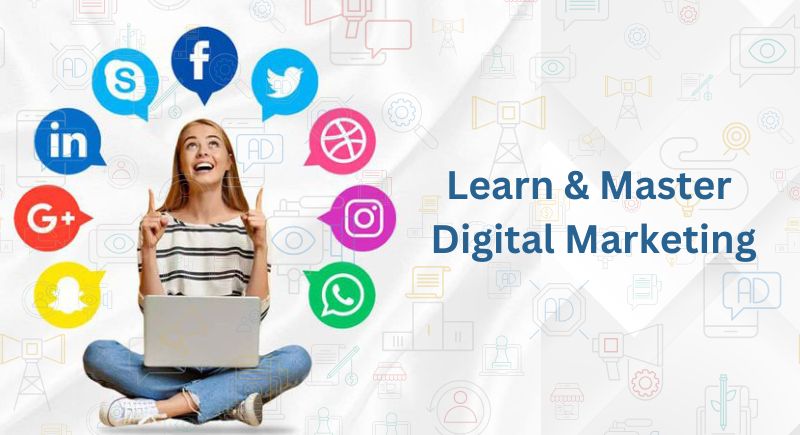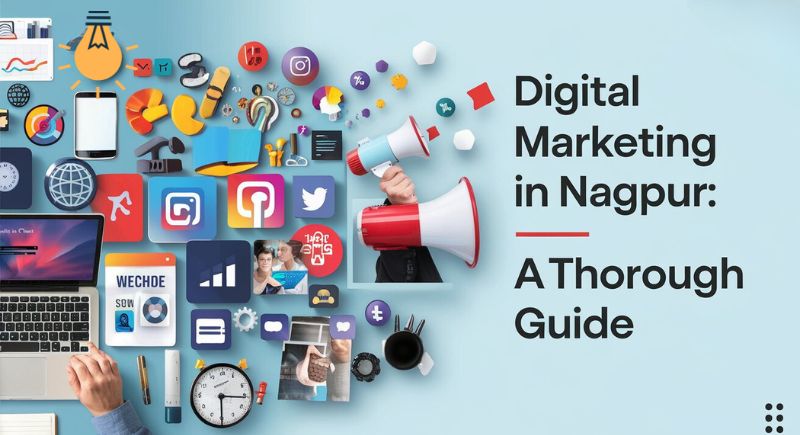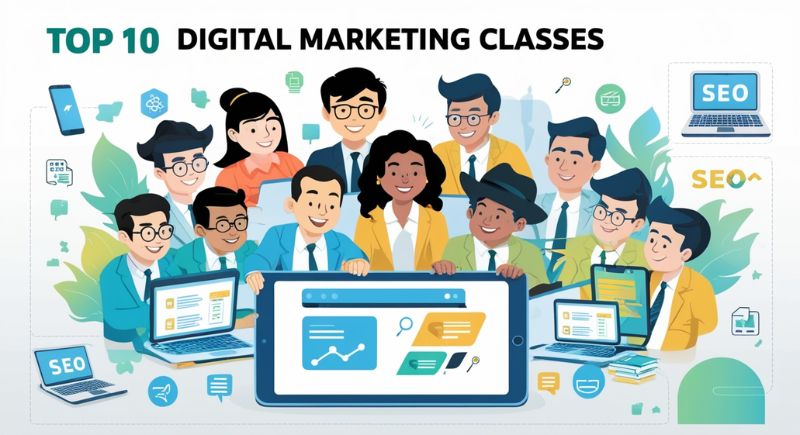Digital Marketing Training in Nagpur: A Guide to Learning and Growing in the Field

Digital Marketing Training in Nagpur: A Guide to Learning and Growing in the Field
In today’s digital age, digital marketing training in Nagpur offers individuals an opportunity to gain expertise in one of the most dynamic fields available. Digital marketing has become essential for businesses to connect with customers, enhance their visibility, and drive growth through online platforms. This blog provides insights into the benefits, modules, and career opportunities associated with digital marketing training in Nagpur, aiming to inform and guide you in exploring this exciting field.
Benefits of Digital Marketing Training in Nagpur
Some of the benefits of undergoing this training include:
1. In-Depth Knowledge: Digital marketing training covers various online marketing concepts, from basic to advanced levels. This knowledge is essential for understanding how to build and maintain a brand’s online presence.
2. Skill Development: Digital marketing training in Nagpur focuses on developing practical skills, allowing participants to work with real-world digital marketing tools and platforms.
3. Improved Career Prospects: With companies across industries needing digital marketers, digital marketing training in Nagpur can significantly improve your employability.
4. Hands-On Experience: Training programs offer practical sessions, helping learners gain experience with essential tools, including SEO software, social media management tools, and content management systems.
Modules Covered in Digital Marketing Training in Nagpur
A comprehensive digital marketing training in Nagpur covers a variety of modules, each focusing on a different aspect of digital marketing. Some of the essential modules include:
1. SEO and SEM Digital marketing training often starts with SEO (Search Engine Optimization) and SEM (Search Engine Marketing), which are critical for driving organic and paid traffic to a website. In this module, learners understand how search engines work, the importance of keywords, on-page SEO, off-page SEO, and PPC (Pay-Per-Click) campaigns.
2. Social Media Marketing (SMM) Social media platforms like Facebook, Instagram, Twitter, and LinkedIn play a significant role in brand promotion. The digital marketing training includes learning about social media strategies, audience targeting, and content creation for these platforms.
3. Content Marketing Content is the backbone of digital marketing. The content marketing module in digital marketing training teaches participants how to create engaging and relevant content. This module includes blog writing, video creation, infographics, and storytelling.
4. Email Marketing In digital marketing training in Nagpur, learners gain insights into crafting impactful emails, managing campaigns, and tracking performance metrics.
5. Web Analytics Digital marketing training in Nagpur includes a module on web analytics, helping participants learn to measure website performance, analyze user behavior, and make data-driven decisions.
Career Opportunities After Digital Marketing Training in Nagpur
Completing digital marketing training in Nagpur opens doors to various career paths. Some of the popular roles you can pursue include:
- SEO Specialist: This role is essential for increasing a brand’s visibility and attracting organic traffic.
- Social Media Manager: As a social media manager, one oversees a brand’s presence across social platforms, creating and curating content, engaging with followers, and analyzing social media metrics.
- Content Strategist: Content strategists develop and manage content plans that align with a brand’s goals. This role is crucial in creating consistent and relevant content across platforms.
- Email Marketing Specialist: An Email Marketing Specialist strategy involves several key components, from audience segmentation to crafting engaging content and analyzing performance. Here’s an outline of a comprehensive strategy
- Digital Marketing Analyst: A digital marketing analyst examines data to measure the effectiveness of campaigns and identify areas for improvement.
- SEM Specialist: They work on targeting the right audience, managing ad budgets, and optimizing ads for maximum reach.
Tools Learned in Digital Marketing
Hands-on experience with tools is a significant part of digital marketing training in Nagpur. Key tools:
Google Analytics: Google Analytics is widely used for tracking website performance. Trainees learn to analyze metrics, understand audience behavior, and generate reports.
Google Ads: Google Ads allows digital marketers to create and manage pay-per-click (PPC) campaigns. Digital marketing training includes learning how to set up, monitor, and optimize ad campaigns.
SEO Tools: Several SEO tools, such as SEMrush, Ahrefs, and Moz, are covered in digital marketing training in Nagpur.
Social Media Management Tools: Tools like Hootsuite, Buffer, and Sprout Social allow marketers to schedule posts, track engagement, and analyze social media performance.
Email Marketing Platforms: Platforms such as Mailchimp, Constant Contact, and SendGrid help learners create email campaigns, manage subscriber lists, and track engagement rates.
Importance of Staying Updated in Digital Marketing
Digital marketing training emphasizes the importance of continuous learning and adapting to industry changes. Keeping up-to-date on the latest trends, like AI in marketing, influencer collaborations, and video marketing, is crucial for remaining competitive in the job market.
Recent Trends Covered in Digital Marketing Training in Nagpur
1. Artificial Intelligence (AI): AI has become essential in automating tasks like chatbots, personalized content, and predictive analytics.
2. Video Marketing: Video content continues to grow, with platforms like YouTube, Instagram, and TikTok leading the way. Video marketing strategies are covered as a core component of digital marketing training in Nagpur.
3. Voice Search Optimization: With the rise of smart speakers and voice searches, optimizing content for voice search is increasingly important.
4. Influencer Marketing: Collaborating with influencers has proven effective in reaching targeted audiences. This aspect is also highlighted in digital marketing training to help learners understand the potential of influencer partnerships.
How Digital Marketing Training in Nagpur Can Help Entrepreneurs
For aspiring entrepreneurs, digital marketing training in Nagpur offers essential tools and knowledge to establish and grow an online presence. Understanding digital marketing enables business owners to market their products effectively, reach their target audience, and compete with larger brands. Here are:
- Building a Website: Learning the basics of website creation, design, and optimization is vital for online business success.
- SEO Strategies: Knowing SEO allows entrepreneurs to optimize their website and rank higher in search results, driving organic traffic.
- Social Media Engagement: Entrepreneurs can leverage social media to connect with customers, gather feedback, and promote their brand.
- Budget-Friendly Advertising: Through digital marketing training, entrepreneurs learn cost-effective ways to advertise on social media and search engines, ensuring they can compete effectively even with limited budgets.
Challenges in Digital Marketing Training in Nagpur
Though digital marketing training in Nagpur provides numerous benefits, it also comes with challenges. Some of the common challenges faced by learners include:
- Understanding Algorithms: Platforms like Google, Facebook, and Instagram constantly change their algorithms, making it necessary for learners to stay updated.
- Creating Engaging Content: With a high volume of digital content available, standing out can be challenging. This requires creativity and strategy, which are crucial parts of digital marketing training in Nagpur.
- Data Analysis: Analyzing data is essential for successful digital marketing, but many new learners find this aspect challenging.
Key Components of Digital Marketing
Digital marketing encompasses many techniques and strategies that work together to achieve marketing objectives. Primary components involved:
1. Content Creation and Marketing
Marketers work on crafting high-quality content, understanding that it serves to attract, inform, and convert potential customers. Content marketing focuses on strategically sharing content across different platforms to build credibility, enhance brand image, and create a connection with the audience. Effective content marketing involves regular updates and optimization, ensuring that the material stays relevant and appealing.
2. Search Engine Optimization (SEO)
By optimizing various aspects of a site, like using targeted keywords, improving page load speed, and enhancing the user experience, marketers can make the site more attractive to search engines.
SEO has several components:
1. On-Page SEO: This includes optimizing individual pages with the right keywords, meta tags, and structured data.
2. Off-Page SEO: Backlink building and social signals help establish a site’s authority, which search engines favor.
3. Technical SEO: This focuses on optimizing the website structure, ensuring it’s mobile-friendly, secure, and easy for search engines to crawl.
Through effective SEO, brands can attract more organic traffic, resulting in higher chances of conversion.
3. Social Media Marketing
Social media marketing involves using platforms like Facebook, Instagram, LinkedIn, and Twitter to promote products, services, or content. Key aspects:
1. Audience Engagement: Building a following and engaging with users through comments, likes, shares, and messages.
2. Content Strategy: Sharing tailored content that resonates with the audience, which may include promotional posts, educational content, and interactive stories.
3. Advertising: Platforms offer paid advertising options, which allow marketers to reach specific demographics and measure campaign effectiveness.
Social media is an essential part of digital marketing because it offers a direct line of communication with customers, providing real-time feedback and interaction.
Email marketing remains one of the most effective methods for reaching an audience on a personal level. It allows brands to maintain direct contact with subscribers by sending targeted messages, newsletters, and promotional offers. Successful email marketing campaigns often involve segmenting audiences based on their preferences and past behavior, enabling marketers to provide content that is relevant to each subscriber.
Effective email marketing is about building trust with the audience, offering value through meaningful content, and keeping communication consistent without overwhelming subscribers.
5. Pay-Per-Click (PPC) Advertising
Google Ads, for example, is one of the most popular PPC platforms, where brands can bid on keywords to appear at the top of search results.Key aspects:
With PPC, it’s possible to target specific audiences based on demographics, interests, and search behavior. The main benefit of PPC is its ability to generate immediate traffic, which can be especially valuable for new businesses or time-sensitive promotions.
Essential Tools for Digital Marketing
Various tools are available to help marketers analyze data, manage campaigns, and optimize performance. Here are some commonly used tools across different areas of digital marketing:
- Google Analytics: This tool provides insights into website traffic, user behavior, and conversion rates, helping marketers make informed decisions based on data.
- SEMrush and Ahrefs: These tools are used for SEO and keyword research, allowing marketers to analyze competitors, track keywords, and improve their website’s visibility.
- Hootsuite and Buffer: Social media management tools like these help marketers schedule posts, manage multiple accounts, and analyze engagement metrics across platforms.
- Mailchimp and Constant Contact: Email marketing platforms offer templates, list management, and automation features to help marketers effectively reach their subscribers.
Using these tools effectively requires knowledge of metrics, a keen sense for interpreting data, and the ability to make adjustments to improve results.
Measuring Success in Digital Marketing
To ensure the effectiveness of a marketing campaign, it’s crucial to track and measure various metrics. Key performance indicators (KPIs) are chosen based on specific goals, whether they involve increasing traffic, boosting engagement, or achieving conversions. Some common KPIs include:
1. Traffic and User Behavior: Metrics like page views, bounce rate, and time on site help marketers understand how users are interacting with a website.
2. Conversion Rate: This metric shows the percentage of users who complete a desired action, such as filling out a form or making a purchase.
3. Click-Through Rate (CTR): CTR is used to evaluate the effectiveness of PPC ads and email campaigns, indicating how many users clicked on a link out of the total who viewed it.
4. Return on Investment (ROI): It’s calculated by comparing the revenue generated with the costs involved in running the campaign.Regularly tracking these KPIs helps marketers make informed adjustments to their strategies and tactics, improving the chances of success in future campaigns.
Emerging Trends in Digital Marketing
Staying updated on these trends is vital for marketers looking to keep their strategies effective. Some current trends include:
1. Artificial Intelligence and Automation: AI is playing a significant role in personalizing user experiences, automating routine tasks, and analyzing vast amounts of data quickly. Chatbots powered by AI, for example, can handle customer inquiries 24/7, providing quick responses and enhancing customer satisfaction.
2. Video Marketing: Video has become one of the most popular content formats, with platforms like YouTube, TikTok, and Instagram driving its growth. Videos allow for storytelling, which can create an emotional connection with the audience and encourage sharing.
3. Voice Search Optimization: With the rise of smart devices like Amazon Alexa and Google Home, voice search is becoming more popular. Marketers are now optimizing content to answer voice search queries, focusing on conversational keywords and concise answers.
4. Influencer Partnerships: Collaborating with influencers can help brands reach specific audiences who trust the influencer’s recommendations. This trend has been particularly effective on platforms like Instagram and YouTube, where influencers share products and services with their followers.
Conclusion
Digital marketing training in Nagpur offers a well-rounded introduction to the digital marketing field, covering a variety of skills, tools, and techniques. With dedicated modules in SEO, social media, content marketing, and more, learners gain both theoretical and practical knowledge. Digital marketing is a powerful tool for enhancing one’s career and business prospects, and with digital marketing training, individuals can confidently step into this rewarding industry.
Through consistent practice, continuous learning, and adapting to the latest trends, anyone can harness the power of digital marketing to achieve success. Whether aiming for a career in digital marketing or seeking to boost a business, digital marketing training in Nagpur offers valuable insights and skills for the digital age.








